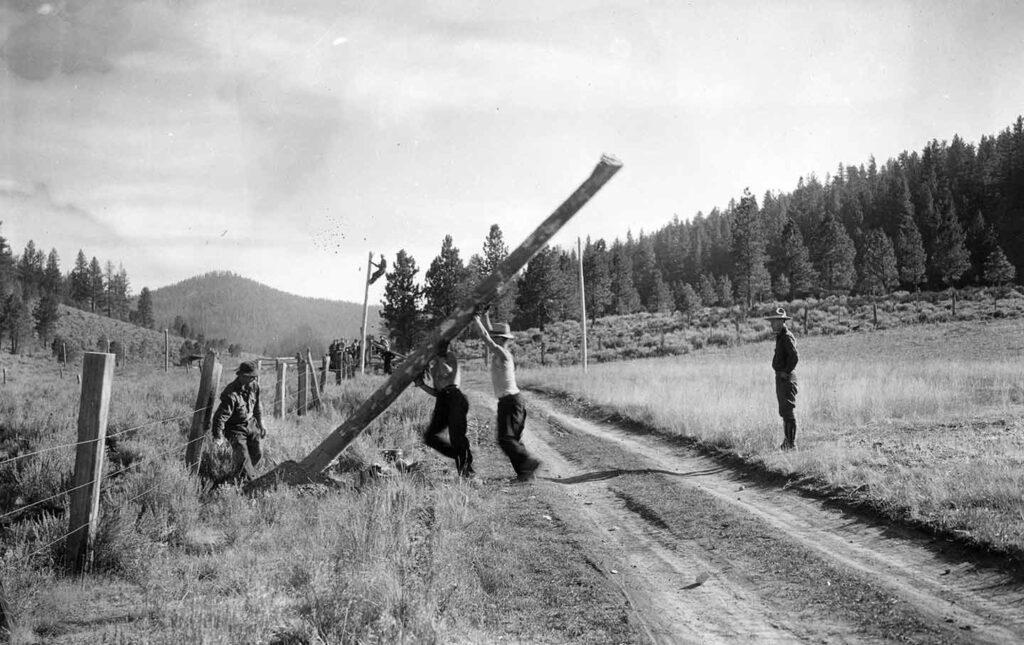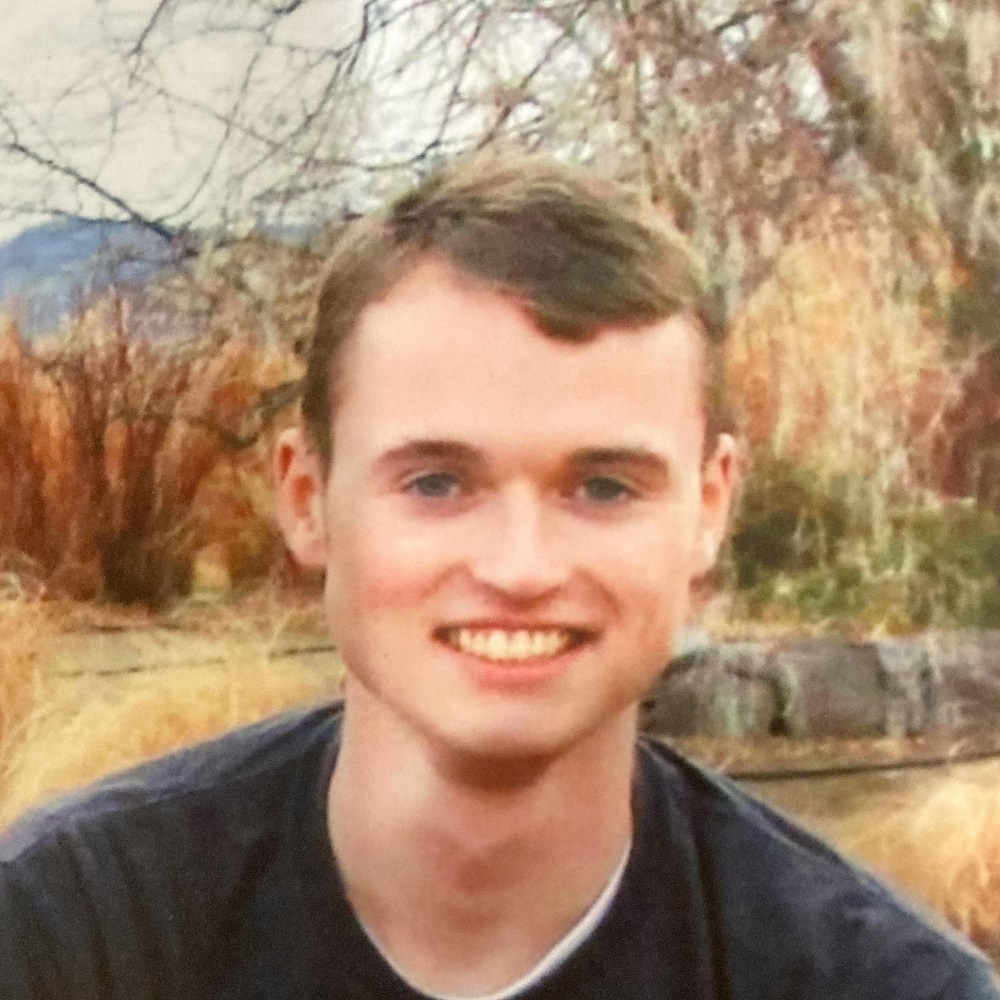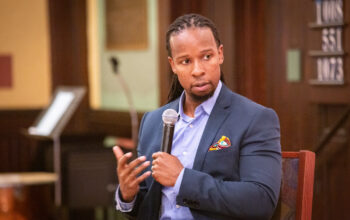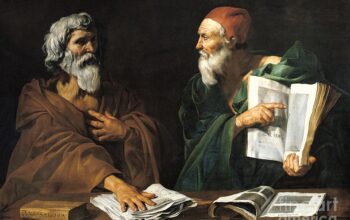It’s becoming more and more obvious that the American political system is broken. But the anger and division that plague the halls of government and the news media is only a symptom of a larger issue in American society: the decay of American community.

Every Thanksgiving, people across the country prepare themselves for what has come to be an unfortunate holiday tradition: rancorous political arguments. In modern America, political incivility has become the norm. Our era has been described as one where Americans are “more divided than we’ve been since the Civil War.” Partisan polarization has divided families, and politicized what were formerly non-political topics, from food to the appropriate personal response to the COVID-19 pandemic. Americans are increasingly likely to disagree- sometimes violently- not only about what the government should do, but even on more fundamental topics such as what the United States is and whether it is something to be celebrated or denigrated.
The polarization of American society has been widely remarked upon by the media, and many theories have been put forward as to why political parties have become more extreme and why partisans dislike each other more. While there are many factors which influence the grasp politics has on national society, one fundamental cause is the rise of performative politics in response to the decline of traditional civic society. The social capital which made productive political engagement possible has worn thin, resulting in a society more disconnected from each other than ever before, stuck in partisan echo chambers and isolated from real practices of self-government. Only a renewal of American civic culture will be sufficient to halt the development of poisonous partisanship.
Polarization and Civic Institutions
One of the root causes of modern American political polarization is the long decline of civic associations that has sapped the vitality of American social organization for decades. As early as the 1950’s, sociologist Robert Nisbet noted that American society had been weakened by the decay of traditional community ties- of family, church, town and their various accessory organizations- whose functions were, slowly but surely, being replaced by the administrative state. The prosperity of the post-WWII United States obscured the weakening of American community for a while, but the political crisis of the modern era has shown that we neglect subsidiary institutions at our peril. As Robert Putnam chronicled in his bestselling book Bowling Alone, 20th century US civil society has seen declines in almost every metric. Americans spend less and less time in family activities, in churches, in service organizations, in fraternal organizations, in sports leagues, in book clubs, in communal political advocacy organizations, and in neighborhood social interaction. In other words, modern American society is increasingly fractured, leading to a generation of isolated, alienated people. Technology can simulate social connection, but it fails miserably at fulfilling the very human need for community. The consequence is reduced economic mobility and increasing rates of loneliness, mental illness and social dysfunction.
The civic associations of American society not only helped people to flourish personally, they were vital for the health of the American political system. Civic associations bound people together into communities working for common purposes, in the process helping them come to respect even those with whom they disagreed. Political action in its correct sense is action of the community aimed at a common good; citizens advocate for their own interests, but must be willing to make some sacrifices in order to achieve higher ends. However, this sacrifice means that people must be devoted to the community. In his landmark book Democracy in America, Alexis de Tocqueville noted, “Feelings and opinions are recruited, the heart is enlarged, and the human mind is developed by no other means than by the reciprocal influence of men upon each other. I have shown that these influences are almost null in democratic countries; they must therefore be artificially created, and this can only be accomplished by associations.” As people live, interact with, and serve with each other in their communities, affection and devotion are the natural result.
With the decline in social integration, people have gradually lost their attachments to local communities. The nationalization of modern politics is a direct result of this decline in community sympathies and the rise in partisan identity. This has led to significant political frustration and alienation. One ordinary person, or even one group of such people, is generally much too insignificant to have any real influence on federal government policy. The result is anger: citizens who feel unheard, unrepresented, and who eventually lose interest in political participation because they feel that their contribution does not matter.
Performative Politics & Polarization
As social capital and community cohesion has declined, people’s identification as members of their local communities has in large part been replaced by their allegiance to a political party. Much of the political polarization which plagues American society comes from the fact that politics has become an exercise in identity.
Every person naturally desires an identity, a group to belong to. Identity, in the sociological sense, helps us to understand who we are, what we want and value, and gives us a sense of belonging to something greater than ourselves. Identity often serves a very positive role in people’s lives, helping them to find meaning and purpose. However, when identity divides, rather than unites, it causes serious friction between groups. When groups live apart, this is often minimal, as disagreements can be resolved by the groups simply going their separate ways. However, when identity divides a community from within, it causes serious issues.
At the present, if you know someone’s political affiliation, you are likely able to guess their race, religion, whether they live in an urban area or not, their views on issues as disparate as abortion and income taxation, and even what kinds of foods they like. Political partisanship has become a kind of mega-identity which many other identities, including religious affiliation and class, are subsumed by.
With politics becoming more partisan and identity-driven, political participation has shifted from being primarily the practice or habit of self-government to being more and more a kind of self-affirmation. This is what is meant by performative politics. We watch the news that tells us about national events from ‘our’ perspective, we put out signs so that everyone knows who ‘we’ are, and we follow people on social media who tell us how ‘we’ have it right and ‘they’ are wrong, and possibly evil. Even minor, theoretically non-political issues are often caught up in identity signalling: it’s not uncommon to hear people remark that they wear or do not wear a mask because they do not want to be mistaken for someone with the incorrect political views. Performance in political matters becomes a source of personal meaning and self-creation; it is no longer about solving problems, it is about being better than “them.”
Politicians have been among the first to embrace performative politics as a partisan strategy, often without even understanding what was going on. It is now more common than ever for parties to attempt to pass partisan ‘show’ bills which have no chance whatsoever to become law, simply in order to drum up support from their base. Similarly, rallies and protests do little to contribute to the deliberative process, but are excellent opportunities for politicians to signal tribal allegiance. Partisanship can also be wielded as a weapon against potential competition: on the left, candidates accuse their primary opponents of not being progressive enough, while on the right, being successfully branded as a “Republican In Name Only” can be enough to sink a run for office. In this environment, compromise- a vital part of communal problem solving- becomes a political liability.
As politics becomes a matter of identity rather than the practice of self-government, it creates a new kind of polarization. Most analyses of political polarization examine what is known as ideological polarization, which occurs when a people or political system is divided by their attitudes on political issues. Abortion, for example, is a deeply polarized issue, with both sides strongly committed to diametrically opposed policies. However, politics as identity creates what is known as affective polarization, which occurs when partisans not only disagree, they actively dislike each other based on the sole fact of their partisanship.
Affective polarization is proving to be a significant force in American society. The Pew Research Center has found that over the past few years Americans are less likely to like people from opposing parties, to be friends with them, or even want to live around them. It is now less likely than ever for people from opposite parties to marry, and 11% of Americans have ended a romantic relationship over political differences. The result is a divided nation, one where people identify more strongly with their party than with their community.
This kind of polarization is particularly dangerous because it makes politics into a zero-sum game. When politics is primarily about promoting the common good of a country, state, or city, then a good political solution is the one which best serves the interests of the community at large, regardless of party affiliation. However, when political parties become personal identities, the political process ceases to be about solving problems and instead is concerned with winning for its own sake. Victory for the party is validation for the partisans, and the humiliation and victimization of their opponents creates a sense of superiority divorced from any implementation of policy or real political improvement. Performative politics turns the political process into a mechanism for status seeking, and as social scientists have long noted, status is a zero-sum game.
The Road Back: A Conscious Communitarianism
In order for American society to function well once again, we must rebuild American civic associations and the habit of self-governance. This can best be done on the local, rather than the national level, because it is much easier to help a neighborhood come together as a community than an entire nation. A revival of American civic culture will take conscious communitarianism and real effort over a long period of time. It will require a repudiation, to a certain extent, of both the social and political culture of the time. Despite the difficulties however, it is certainly achievable. Dedicated groups of people can work to enrich the associational lives of their fellow citizens one community at a time, reviving American civic association from its roots.
Local civic associations can do great work in depolarization by bringing people of diverse views into contact with one another, helping them to see each other as friends and fellow citizens rather than opposing partisans. They can also help people learn to set their differences aside as they work together for a larger cause. There are many opportunities and patterns for creating these associations. Cooperatives, for example, allow communities to work together for economic benefit, while service organizations harness local talent and resources for the common good. Another kind of civic association that is rare in modern times but was common in the past is the intellectual association- Chautauqua clubs, debate clubs, book clubs, and philosophical societies were all common features of American communities in the not-so-distant past. The almost unlimited variety of civic associations creates a field of great adaptability for conscious communitarians of diverse skills, interests, and resources.
In addition to fostering local civic life, conscious communitarianism would embrace local government as a powerful tool for helping Americans learn and shape the political process. Media often obscures the fact that real self-government is a difficult and often complicated affair that requires compromise. Participation in local government is a vital way to expose people to the real demands of political action and learn the skills necessary to settle disagreements and solve issues in the political sphere effectively. Additionally, politics at the local level is usually relatively insulated from national issues, making local politics a relatively safe space from the strongly bipolar attitudes of contemporary politics. By increasing community engagement in local politics, Americans can promote attachment to and investment in their community, decrease political polarization, and create a citizenry with a greater capacity for self-governance.
Although performative politics and affective polarization have riven deep fractures into American society, the outlook is bright for a renewal of American society. More and more people are recognizing the poverty of contemporary American community life, and are willing and motivated to change the situation. By rejecting performative politics and embracing a conscious communitarianism built on civic associations and local government participation, involved citizens can build an American culture with a renewed capacity for real community and self-government.




